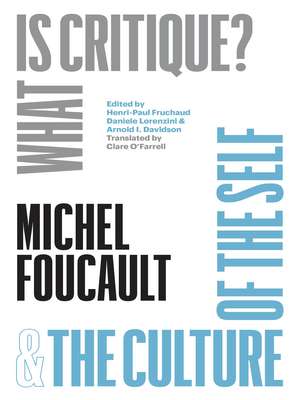"What Is Critique?" and "The Culture of the Self": The Chicago Foucault Project
Autor Michel Foucault Editat de Henri-Paul Fruchaud, Daniele Lorenzini, Arnold I. Davidson Traducere de Clare O'Farrellen Limba Engleză Hardback – 2 ian 2024
On May 27, 1978, Michel Foucault gave a lecture to the French Society of Philosophy where he redefined his entire philosophical project in light of Immanuel Kant’s 1784 text “What Is Enlightenment?” Foucault strikingly characterizes critique as the political and moral attitude consisting in the “art of not being governed like this,” one that performs the function of destabilizing power relations and creating the space for a new formation of the self within the “politics of truth.”
This volume presents the first critical edition of this crucial lecture alongside a previously unpublished lecture about the culture of the self and three public debates with Foucault at the University of California, Berkeley, in April 1983. There, for the first time, Foucault establishes a direct connection between his reflections on the Enlightenment and his analyses of Greco-Roman antiquity. However, far from suggesting a return to the ancient culture of the self, Foucault invites his audience to build a “new ethics” that bypasses the traditional references to religion, law, and science.
Preț: 232.60 lei
Nou
Puncte Express: 349
Preț estimativ în valută:
44.51€ • 46.38$ • 36.85£
44.51€ • 46.38$ • 36.85£
Carte disponibilă
Livrare economică 13-27 martie
Livrare express 27 februarie-05 martie pentru 33.69 lei
Preluare comenzi: 021 569.72.76
Specificații
ISBN-13: 9780226383446
ISBN-10: 022638344X
Pagini: 208
Dimensiuni: 140 x 216 x 20 mm
Greutate: 0.54 kg
Ediția:First Edition
Editura: University of Chicago Press
Colecția University of Chicago Press
Seria The Chicago Foucault Project
ISBN-10: 022638344X
Pagini: 208
Dimensiuni: 140 x 216 x 20 mm
Greutate: 0.54 kg
Ediția:First Edition
Editura: University of Chicago Press
Colecția University of Chicago Press
Seria The Chicago Foucault Project
Notă biografică
Michel Foucault (1926–1984) was a French philosopher and historian who held the Chair of the History of Systems of Thought at the Collège de France. Henri-Paul Fruchaud is an editor of Michel Foucault’s posthumous works. Daniele Lorenzini is associate professor of philosophy at the University of Pennsylvania. Arnold I. Davidson is Distinguished Professor of Humanities at the Hebrew University of Jerusalem as well as the Robert O. Anderson Distinguished Service Professor Emeritus at the University of Chicago. Clare O’Farrell is a senior lecturer at the Queensland University of Technology in Brisbane, Australia. She is the founding editor of Foucault Studies.
Cuprins
Editors’ Note
Introduction
Index
Henri-Paul Fruchaud and Daniele Lorenzini
Translator’s NoteClare O’Farrell
Abbreviations of Works by Michel FoucaultIntroduction
Daniele Lorenzini and Arnold I. Davidson
What Is Critique? (Lecture to the Société française de Philosophie | May 27, 1978)Michel Foucault
The Culture of the Self (Lecture at the University of California, Berkeley | April 12, 1983)Michel Foucault
Discussion with the Department of Philosophy
Discussion with the Department of History
Discussion with the Department of French
NotesDiscussion with the Department of History
Discussion with the Department of French
Index
Recenzii
“Between 1978 and 1983, Foucault’s work underwent a dramatic and much-discussed shift from a focus on governmentality and biopolitics to an exploration of ancient techniques and practices of the self. This new volume juxtaposes two texts that chart this transformation and situate it in relation to Foucault’s simultaneously emerging interest in reanimating Kantian notions of critique and enlightenment. This volume will be an invaluable resource for anyone interested in Foucault’s late work and its relevance for the practice of critical theory, broadly construed.”
“In his lectures, Foucault often sharply sums up essential ideas about his work. These two seminal lectures, ‘What Is Critique?’ and ‘The Culture of the Self,’ are no exception. They reveal the stakes of his inquiry: philosophy has always been, since its inception, a practice of critique and a technology of the self. It is in this dual task that we must still find its meaning today.”




